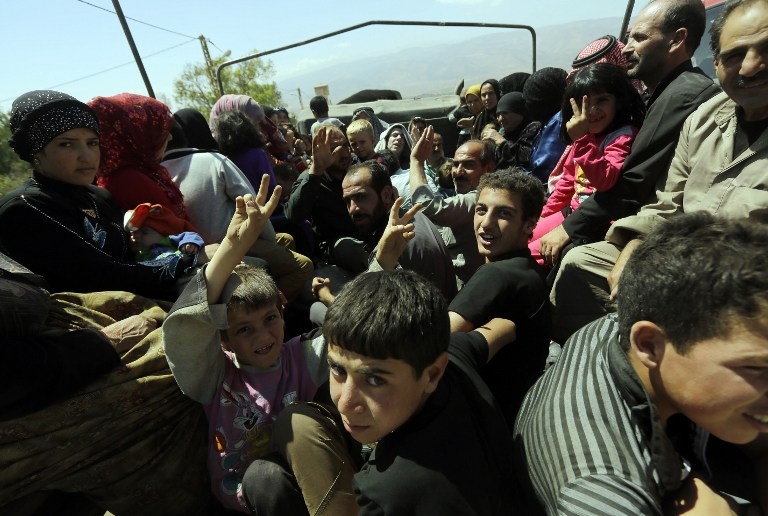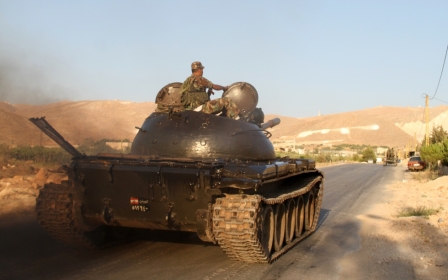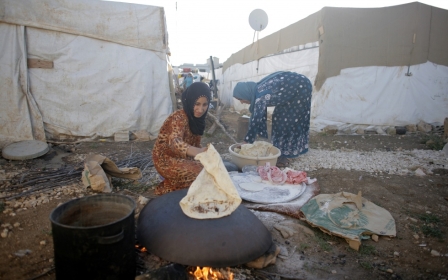Clashes continue in Lebanese town of Arsal

Clashes between Lebanese troops and unidentified militants in the town of Arsal on the Syrian borders continue for a third day on Monday as the struggle between neighbouring rival factions in Syria spills over.
A military source said the fighting has killed at least 16 soldiers, two of them officers, as well as "dozens" of militants, reported AFP.
In a statement, the army said 22 soldiers were missing and 86 had been wounded in the fighting. At least three civilians have also been killed in the fighting, according to security sources.
“Over the past two days, a group of militants - most probably affiliates of the Islamic State (IS) - has targeted the Lebanese army and local security forces,” said Kamel Kozbar, a Saida municipality representative.
“What is surprising is that the struggle has not been limited to fighting between Lebanese troops and the militants. There has also been shelling from regions controlled by Hezbollah onto Arsal. It seems there are groups who want to further exacerbate the situation in a region which has opened its doors and supported civilian Syrian refugees.”
While Arsal is home to 40,000 Lebanese, it also houses at least 120,000 Syrian refugees who have crossed over since the onset of the Syrian civil war, official estimates have said.
“Both the Syrian refugee camps in Arsal and the homes of local residents have been hit by random shelling from Hezbollah-controlled areas and by the Army’s targeting of the militants,” said Kozbar.
“Six refugee camps have been completely burned down while nine others have been severely damaged by the shelling,” declared a statement released by the Union of Relief and Development Associations in Lebanon.
“Paramedics have not been able to access the dead bodies and injured people strewn on the streets of Arsal due to the continuous shelling which has targeted ambulances, cars, the al-Rahma Hospital and Arsal’s medical and emergency centre,” added the statement.
Mortar rounds and heavy artillery fire could be heard around Arsal on Monday, with hundreds of local residents fleeing in the early hours of the morning.
"We didn't sleep all night because of the fighting," said Ahmed Hujairi, 55, who left with his family.
"The armed men are not letting anyone else leave. They fired over our heads to stop us from leaving," he added.
He said the gunmen were from different countries, dressed in black and were "very well-organised."
“Tens of thousands of Syrian refugees as well local Lebanese residents have left their homes but are trapped in Arsal,” said Kozbar.
Fears of a new civil war
The fighting has raised new concerns about the effects of the Syrian conflict on Lebanon, which fought a brutal 1975-1990 civil war and is home to a multi-ethnic and sectarian population.
Emile Hokayem, a senior fellow for regional security at the International Institute for Strategic Studies, said the situation in Arsal was an inevitable "spill over" from the Syrian conflict.
Analysts and locals fear that an aggressive army response or the involvement of Hezbollah's fighters could further escalate the situation in the Sunni-majority town.
"As much as the Lebanese like to think that Syria's problems are coming to Lebanon, the reality is that Lebanon sent fighters for and against Assad to Syria... so we shouldn't be surprised that it's coming here,” said Hokayem.
Hezbollah's involvement "would validate the concerns... of the very people whose cooperation is most important in fighting these groups, which is the Sunni community."
Many of Lebanon's Sunni Muslims resent Hezbollah's outsized military power, and have been angered by its role in Syria.
But the group says it is fighting in Syria to prevent militants from groups like Al-Nusra and the Islamic State threatening Lebanon.
The situation on the ground however reflects a more complex picture.
“There are Hezbollah factions saying they are targeting the militants but in reality they are targeting civilians even though Arsal's’ locals have sided with the Lebanese Army and not the militants. We fear the situation will escalate,” said Kozbar.
“We are calling on the militants to leave Arsal so that the Lebanese Army alone is in control of the region,” he added.
Temporary ceasefire fails
A delegation of Muslim scholars are headed to Arsal to try mediate between Lebanese troops and militant factions, sources on the ground have said.
A 24-hour ceasefire negotiated between the delegation and the head of the Lebanese Army was meant to start at 1800 local time in order to allow for peace talks between the different factions.
“A ceasefire was supposed to be in place by now, but heavy shooting and shelling has continued. We are not sure the delegation will be able to reach Arsal with the heavy shooting still happening,” Kozbar told MEE.
The clashes in Arsal have prompted international concern, including from Washington, as well as domestic condemnation.
Prime Minister Tammam Salam described the assault as "a flagrant attack on the Lebanese state," and former prime minister Saad Hariri, the Sunni community's most prominent political representative, said Lebanon's army was a "red line."
"There will be no leniency with the takfiri (extremist) and terrorist organisations and their destructive project," he told the Al-Hayat newspaper.
The UN refugee agency UNHCR meanwhile said it was reviewing the situation and making plans to deliver aid to Syrian and Lebanese civilians affected by the fighting if needed.
“What is need, is a ceasefire. If the fighting continues, the situation will become more complicated. We don’t want the neighbouring violence to become an internal Lebanese struggle among different Lebanese factions,” said Kozbar.
Syria conflict spills over
Lebanon has officially sought to distance itself from the conflict in neighbouring Syria that began in March 2011, espousing a policy of "dissociation".
But the uprising against Syrian President Bashar al-Assad has crept continually across the border, inflaming existing sectarian and political tensions.
There are more than one million Syrian refugees in Lebanon, testing the limited resources of the country, as well as the patience of its four million citizens.
And the country's powerful Shiite Hezbollah movement has openly intervened in the Syrian conflict, dispatching fighters to bolster regime troops against the Sunni-dominated uprising.
Majority-Sunni Arsal is broadly sympathetic to the uprising against Assad's regime, and has regularly been bombed by Syrian regime troops who say they are targeting opposition fighters holed up in the area.
On Monday, the Syrian foreign ministry issued a statement expressing its "support and solidarity with the Lebanese army as it faces terrorist groups."
The violence in the eastern Lebanese region began on Saturday afternoon, after soldiers detained a Syrian man, Imad Ahmed Jumaa, who the army said confessed belonging to Al-Qaeda's Syria affiliate, Al-Nusra Front.
Militants angered by the arrest opened fire on army checkpoints and stormed a police station, killing two civilians and capturing several police.
Middle East Eye propose une couverture et une analyse indépendantes et incomparables du Moyen-Orient, de l’Afrique du Nord et d’autres régions du monde. Pour en savoir plus sur la reprise de ce contenu et les frais qui s’appliquent, veuillez remplir ce formulaire [en anglais]. Pour en savoir plus sur MEE, cliquez ici [en anglais].



